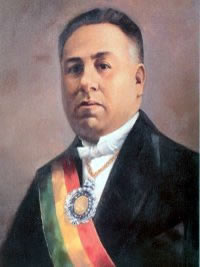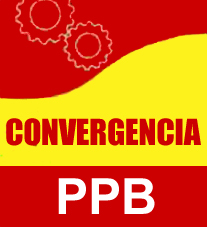
Lidia Gueiler Tejada was the first female President of Bolivia, serving in an interim capacity from 1979 to 1980. She was Bolivia's first and only female Head of State, and the second in American history.

The United States Senate elections of 1940 coincided with the election of Franklin D. Roosevelt to his third term as President.

Elections in Bolivia gives information on elections and election results in Bolivia.

The Plurinational Legislative Assembly is the national legislature of Bolivia, placed in La Paz, the country's seat of government.

The Movement for Socialism–Political Instrument for the Sovereignty of the Peoples, alternately referred to as "Movement Toward Socialism" or "Movement to Socialism", is a Bolivian left-wing socialist political movement led by Evo Morales, founded in 1998. Its followers are known as masistas.

José Manuel Inocencio Pando Solares was President of Bolivia between October 1899 and August 1904. Born in Luribay, he studied medicine, joined the army during the War of the Pacific against Chile (1879–80), and later dedicated himself to exploring his country's vast and thinly populated lowland forests. In the 1880s he joined the Liberal Party of Eliodoro Camacho, becoming its leader in 1894. Pando served as Congressional Representative from Chuquisaca during the administration of Severo Fernández (1896–99) and was the nucleus around which coalesced the increasingly more vocal and seditious efforts of the Liberal Party to topple the Conservatives from power.

Felipe Segundo Guzmán was a Bolivian politician who served as President of Bolivia from September 1925 to August 1926.

José Manuel Gutiérrez Guerra, known as "the last Oligarch," was an economist and statesman, President of Bolivia between 1917 and 1920. He was the grandson of Pedro José Domingo de Guerra, President in 1879, a man of high integrity and chief justice of the Supreme Court, who had died in office after he was forced to assume presidential responsibilities during the disastrous War of the Pacific.

Julio Álvarez del Vayo was a Spanish Socialist politician, journalist and writer.
Bolivia's defeat by Paraguay in the Chaco War of 1932–1936 marked a turning point in the modern history of Bolivia. Great loss of life and territory discredited the traditional ruling classes, while service in the army produced stirrings of political awareness among the indigenous people. A large portion of the contested Gran Chaco region was surrendered to Paraguay. In return Bolivia was given access to the Paraguay River where Puerto Busch was founded and, with this, free access to the Atlantic Ocean through international waters was possible. In 1936 Standard Oil's Bolivian operations were nationalized and the state-owned firm Yacimientos Petroliferos Fiscales Bolivianos (YPFB) was created. From the end of the Chaco War until the 1952 Bolivian National Revolution, the emergence of contending ideologies and the demands of new groups convulsed Bolivian politics.

Plan Progress for Bolivia – National Convergence was a coalition that was Bolivia's largest national opposition political party following the 2009 general elections. PPB-CN is a Bolivian political alliance of the right-wing formed in advance of the 2009 elections. The alliance was created at a meeting in La Paz's Zona Sur on 4 September 2009 by New Republican Force represented by Manfred Reyes Villa, Plan Progress for Bolivia, represented by José Luis Paredes, the former prefect of La Paz department; Autonomy for Bolivia led by Luis Alberto Serrate Middagh; Peoples Party led by Pablo Nicolás Camacho Bedregal; and the Nationalist Revolutionary Movement, led by Guillermo Bedregal Gutiérrez. However, the alliance did not continue to function in Bolivia's 2014 elections, and several of its elected senators stated in late 2013 that its role is ending.
The Socialist Republican Party, whose members were also known as "Saavedristas", was a political party in Bolivia. The Socialist Republican Party emerged on January 28, 1921, as the Republican Party was bifurcated on the same day Bautista Saavedra took office as President of the country. The Socialist Republican Party was formed by Saavedra's followers.
Bolivia held a general election on 5 January 1947, electing both a new President of the Republic and a new National Congress.
Bolivia held a general election on 11 November 1934, electing both a new President of the Republic and a new National Congress, but the results were later nullified. The terms of Senators and Deputies then in office were prorogued to 5 August 1936, by Act of National Congress on 4 August 1935.
Bolivia held a general election on 4 January 1931, electing both a new President of the Republic and a new National Congress.
The Radical Party was founded in 1913, following a split in the Liberal Party in Bolivia.
The Bolivian National Congress 1940–1942 was elected on 10 March 1940.

The Bolivian general election, 2014 was Bolivia's second to take place under the country's 2009 constitution, and the first supervised by the Plurinational Electoral Organ, a newly created fourth branch of government. Incumbent President Evo Morales was re-elected for a third term.













